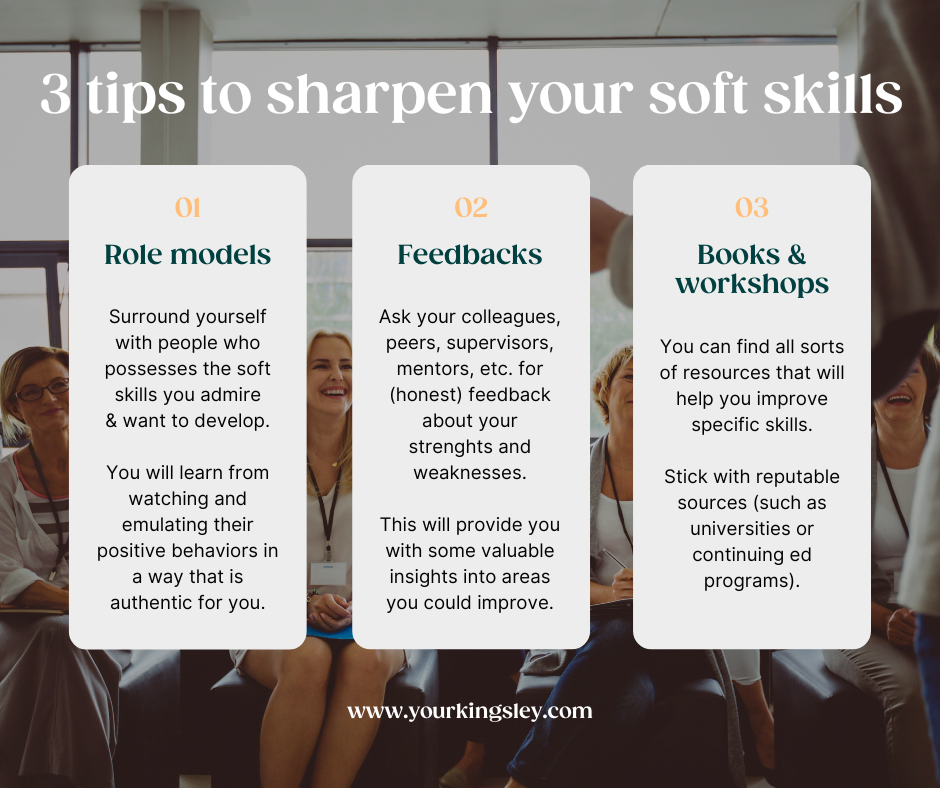Soft skills: the key to success in the workplace
In today’s competitive job market, purely technical skills are no longer enough to stand out from the crowd and optimize your chances of finding a job that matches your expectations, values and ambitions. Soft skills, also known as interpersonal or emotional intelligence, are becoming increasingly important in the eyes of employers. So, what exactly does it cover and why are they so crucial in the workplace?
Soft Skills: what are they?
Soft skills refer to the personal attributes and traits that help individuals interect effectively with others. They are not technical skills or knowledge that can be easily taught, but rather personality traits that are developed over time through life and work experiences. Examples include communication, leadership, teamwork, time management, decision-making, conflict management, problem-solving, adaptability, etc.
Why are they so important in the workplace?
Interpersonal skills are important in the workplace because they can make or break an employee’s success. Employers and recruiters are looking for individuals who not only have technical know-how but also the ability to work well with others and handle challenging situations in a professional and effective manner. Soft skills can also impact the company culture and overall morale, making a positive impact on the workplace.
Taking advantage of soft skills during a recruitment process
When applying for a job, it’s not enough to list your technical skills on your resume. Employers want to see who you are, why you’d fit and what your added-value is. This is why you should show them how you demonstrated your soft skills in previous work experiences. Here are a few ways to showcase your emotional intelligence during the recruitment process:
- Highlight concrete examples of how you’ve used your personal skills (in everyday life, at university, or in a previous work experience). For example, you can talk about how you solved a difficult problem as part of a team, how you coped with stress by effectively managing your time during a tight deadline, or how you kept your cool during a challenging situation with a client.
- Use keywords in your resume and cover letter. This will make it easier for employers to see that you possess the interpersonal skills they’re looking for.
- Prepare to discuss your soft skills in an interview: employers often ask behavioral questions to gauge how you handle certain situations and whether you possess or not the traits they’re looking for.
- Network with people in your industry and seek out opportunities to develop and showcase your soft skills. This can help you build a strong professional reputation and increase your chances of landing your dream job.
How to develop or train personal abilities?
Read books, follow workshops, meet experts…

- Understand why you want to improve: take time to reflect on your strenghts and weaknesses, identify areas you want to improve and create a plan to work on those skills.
- Practice the art of active listening: this will help you better understand others and build stronger relationships (in the workplace).
- Improve your communication skills: clear and effective communication is a key soft skill. Consider taking a course or workshop.
- Work on your emotional intelligence: understanding and managing your own emotions, as well as those of others, is priceless.
- Seek out new experiences: take on new challenges and responsibilities at work to stretch your skills and learn new things.
Remember that developing soft skills takes time and effort, but that it can have a signifcant impact on your career and overall success. By showcasing them during the recruitment process, you can set yourself apart from other candidates and increase your chances of landing your dream job.
For more tips & tricks about your career, follow us on LinkedIn!
